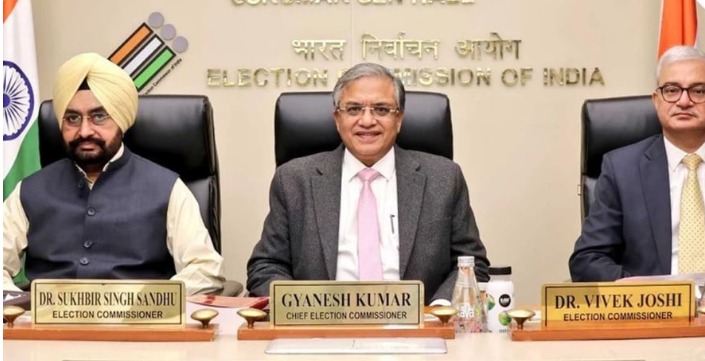New Delhi, 27 October 2025:The Election Commission of India has announced that the second phase of its nationwide “Special Intensive Revision” (SIR) of electoral rolls will cover 12 states and Union Territories.
Full list of the 12 states and union territories where the Election Commission of India (ECI) will carry out Phase-II of the Special Intensive Revision (SIR) of electoral rolls:
- Andaman & Nicobar Islands
- Chhattisgarh
- Goa
- Gujarat
- Kerala
- Lakshadweep
- Madhya Pradesh
- Puducherry
- Rajasthan
- Tamil Nadu
- Uttar Pradesh
- West Bengal
The exercise aims to overhaul the voters’ list by identifying and removing ineligible entries, including duplicate names, and adding newly eligible voters. The final updated rolls from this phase are scheduled to be published on 7 February 2026. Among the states/UTs included are poll-bound regions such as West Bengal, Tamil Nadu, Kerala and Puducherry.
In one earlier phase (Bihar), the ECI reported zero appeals against the survey in that state, which it cited as a positive sign of acceptance.
Accurate and updated electoral rolls are foundational to free and fair elections — they ensure only eligible voters participate and help reduce instances of duplicate or bogus entries.
In many states, upcoming assembly elections raise the stakes for this revision exercise — any significant changes in the rolls may affect voter composition, turnout, and political dynamics.
The revision by February 2026 sets the stage for electoral preparedness across multiple states — for political parties, the administration and civil society alike.
There are political concerns: Some opposition parties argue that such extensive roll revisions close to elections could disenfranchise certain voter segments if not managed transparently.The ECI will need to balance speed with accuracy: while updates must be done timely, ensuring proper verification (age, residence status, duplicate checking) is critical.
States/UTs included in the revision will need strong logistical backing: Booth-Level Officers (BLOs), updated field data, public awareness and grievance redressal systems are key.





